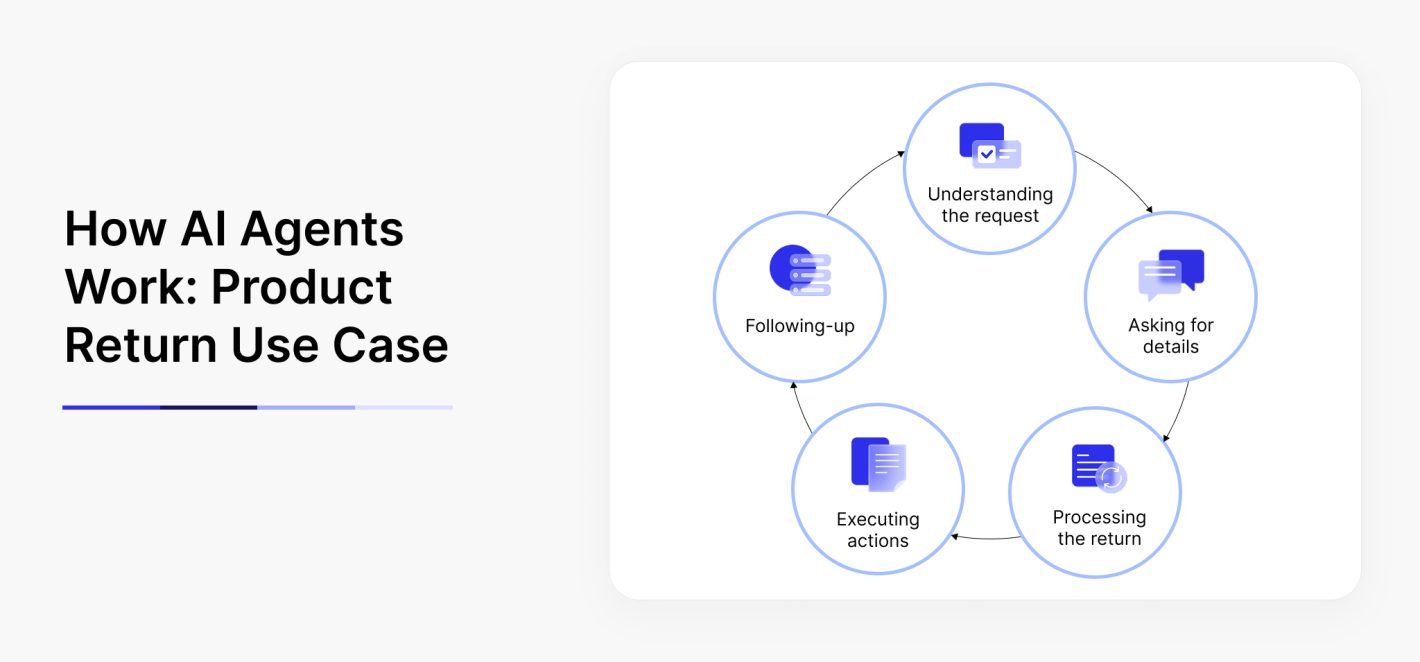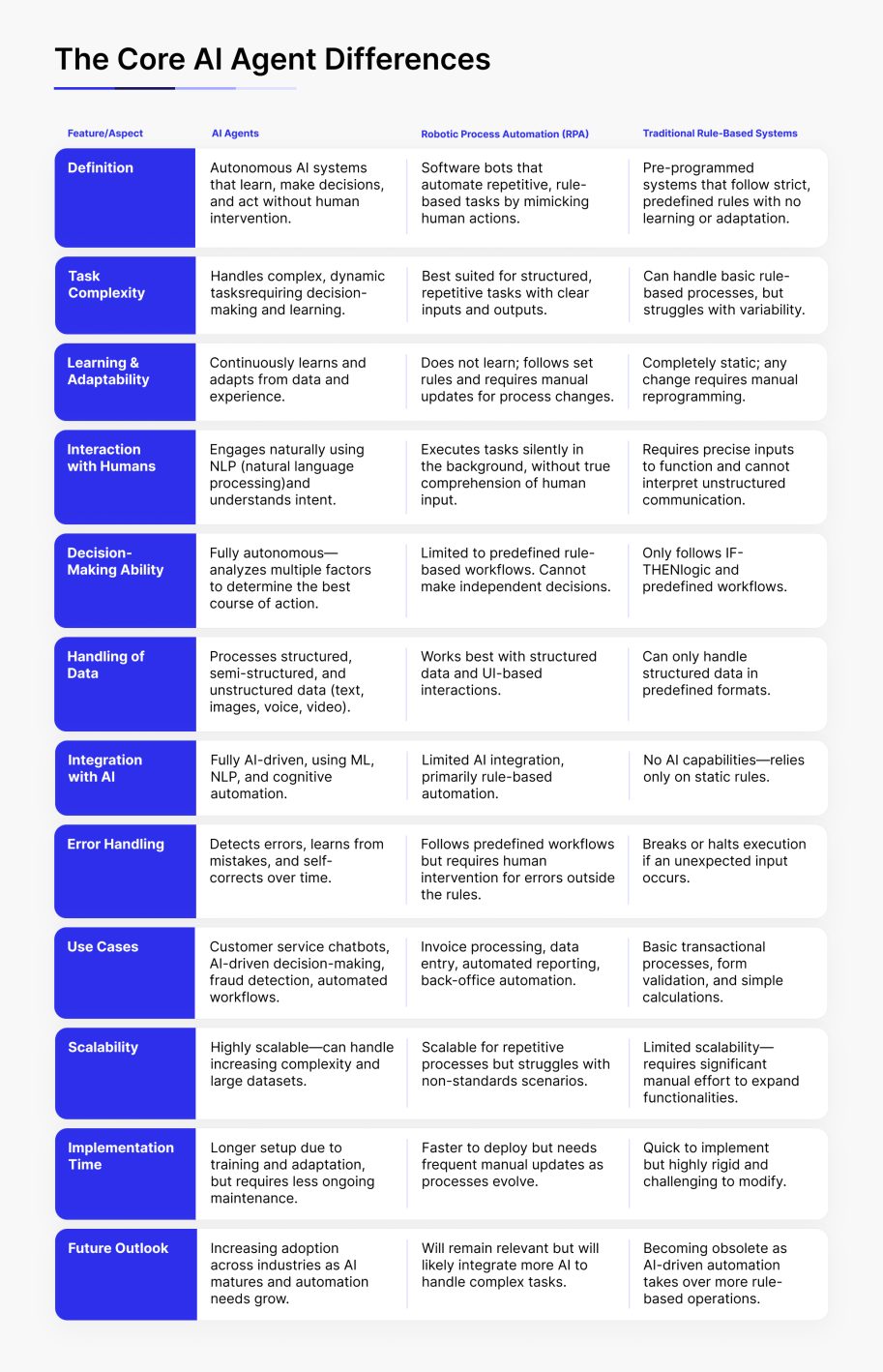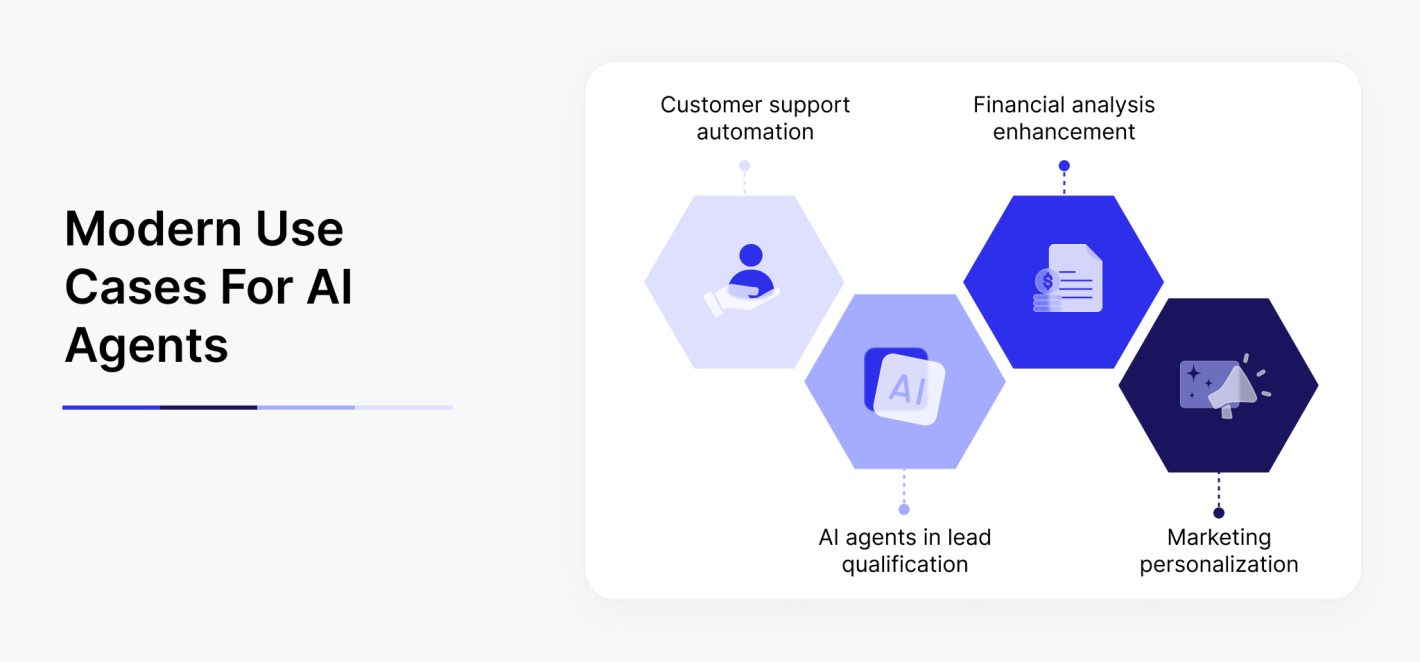The theme of AI agents is becoming a central talking point in enterprise innovation, with high stakes for this year. Firstly, the visionaries of Y Combinator predicted that vertical AI agents could well become the new SaaS. Expect more than 300 AI agent unicorns to be created. Nvidia CEO Jensen Huang has announced the emergence of “Agentic AI” as the next significant technological shift. Sam Altman, CEO of OpenAI, believes that by 2025, we may see the first AI agents “joining the workforce” and significantly impacting company productivity. Finally, some startups even dream of creating Profitable, AI-powered companies with no employees.

Technological advances, enterprise data availability, and software innovation have converged and reached a tipping point. Companies now have the tools and infrastructure to deploy AI agents without needing years of R&D or massive development teams. Companies like Microsoft, Databricks, and Salesforce assert that soon businesses will be able to create AI agents in just a few clicks, utilizing real-time data from their existing systems.
But can AI agents drive a multi-trillion-dollar industry and transform how people work? Sombra invites you to explore the technological advancements behind AI agents in 2025 and why many organizations are investing heavily in their transformative potential.
What Are AI Agents?
Artificial Intelligence agents are fully autonomous AI programs that can communicate with users and initiate actions based on their tasks. In other words, they represent a more advanced and independent level of AI assistants that we are already familiar with.
These systems can act on a whole range of actions, from simple data processing to executing complex, multi-step workflows. For example, if we implement an AI agent in a customer service environment, in addition to typical AI tasks like answering common queries, the AI agent can perform more complex tasks, such as scheduling meetings with the appropriate person, creating tickets, or even following up on unresolved issues — all autonomously, based on predefined workflows.
With such abilities, AI agents are especially valuable for companies that heavily rely on complex, multifunctional systems. And it’s simple: instead of just answering questions and producing text, images or videos, they can truly automate routine tasks, save time, and reduce human error. For enterprises, this level of autonomy in their systems can drive significant improvements in productivity and overall business performance.
How Does an AI Agent Work?
Imagine you want to return a product you purchased online. With an AI agent, all you need to do is open a chat window (similar to ChatGPT) and type your request. Here’s how an AI agent would assist you in handling the return:

AI agents work algorithm
- Understand the Request: You tell the AI agent, “I want to return the shoes I bought last week.”
- Ask for Details: The agent might ask for more information, like “Can you provide the order number or reason for return?” It might also check if the product is still eligible for a return.
- Process the Return: Once the agent has the details, it: Verifies the return policy, checks if the item is within the return window, fills out the necessary forms, or initiates the return process in the store’s system.
- Execute Actions: The agent sends a return shipping label to your email, schedules a pickup for the return shipment, updates the company’s system about the return, and processes your refund request.
- Follow-Up: After everything is done, the AI agent might send you a message saying, “Your return has been processed, and the refund will be issued within 3 business days.”
AI Agent is different from a regular chatbot
Like we said earlier, a regular chatbot can only provide information on the steps a user needs to take. For example, it can tell you which form to sign to process a purchase return. An AI agent, however, doesn’t just inform. It acts. In the case of a return, it will fill out the necessary forms, initiate the return, and even communicate with other systems like ERP. It handles the entire process from start to finish with minimal input from you.
What Makes an AI an AI Agent?
As we already mentioned above, to be named a real AI agent rather than a smart chat-bot, the program must follow a set of principles:
Autonomy – Works without constant human input. It makes decisions and acts on its own.
Intelligence – Learns, analyzes, and solves problems instead of just following preset rules.
Interaction – Communicates with people, systems, or sensors to gather and respond to information.
Goal-oriented – Acts with a purpose, always working toward a defined objective.
Perception – Understands and adapts to its environment through data, sensors, or inputs.
Adaptability – Adjusts its actions when conditions change, improving over time.
The main rule here is that good AI agents constantly monitor the results of their actions and make improvements over time. By analyzing the success or failure of their previous actions, they gather additional data that helps them fine-tune their decision-making process. This continuous learning loop, adaptability, and understanding of environment changes make an ordinary AI agentic AI.

AI agents vs. RPAs vs. Rule-based systems
Modern Use Cases For AI Agents
The applications of AI agents are limited only by your imagination, budget, and time. Some areas are particularly well-suited for intelligent assistants due to the nature of the surface-level tasks they are designed to solve. Here are some examples.

AI agents use cases
Customer Support Automation
This type of agent can handle up to 80% of customer inquiries across multiple channels, including online chat, voice, and email. For example, take Intercom’s Fin AI Agent – a customer support solution designed to handle entire frontline support functions. Since its launch, Fin has resolved over 14 million customer queries for approximately 4,000 businesses, including companies like Monzo and Anthropic. This deployment has led to a reduction in response times and operational costs. Intercom’s commitment to AI is evident, with a $100 million investment in AI technology and plans to expand its AI team by adding 35 more specialists, aiming to build one of the largest AI labs in Europe.
What is unique about this case study? Unlike a standard chatbot that relies on predefined scripts or limited NLP responses, Fin AI Agent autonomously classifies inquiries, determines the best course of action, and even escalates complex cases when necessary. This decision-making ability and adaptability define it as an AI agent rather than just a chatbot.
Financial Analysis Enhancement
Moody’s has deployed a multi-agent AI system to enhance its financial analysis capabilities. These AI agents analyze vast datasets, offering diverse perspectives on financial trends and risks. What’s unique? While ChatGPT can analyze financial reports when prompted, it does not autonomously seek out relevant data, apply specialized financial models, or coordinate with other AI components for deeper insights. Moody’s AI agents operate independently to identify anomalies, assess emerging risks, and cross-reference multiple data sources in real time, showcasing their agentic behavior rather than merely passive analysis.
By operating independently, the agents provide nuanced insights that assist in more informed decision-making. This approach not only increases the depth of analysis but also accelerates the process, enabling Moody’s to respond swiftly to market changes.
Marketing Personalization
HubSpot has integrated AI agents into its platform to enhance marketing personalization. These AI-driven tools analyze customer interactions and behaviors to deliver personalized content and recommendations, thereby improving engagement and conversion rates. HubSpot’s commitment to AI is evident, with the company aiming to become the premier AI-first customer platform for scaling businesses by 2025.
Unlike a standard recommendation engine that follows predefined logic, HubSpot’s AI agents continuously learn from user behavior, adjust content strategies dynamically, and even test different messaging variations without human intervention. Their ability to make strategic marketing decisions on their own, rather than just executing static rules, qualifies them as AI agents.
Leading Platforms Driving AI Agent Growth
Databricks: AI Agent Features
Databricks, known for its powerful data and AI platform, has been actively advancing AI agent technology, particularly through its Mosaic AI Agent Framework, which enables the creation and deployment of autonomous AI systems..
To showcase the practical impact, Databricks is using its own technology internally. The “Field AI Assistant,” detailed at Sales Experience Transformation, is built on the Mosaic AI agentic framework and assists sales teams across the sales lifecycle. It can:

Databricks AI use case
- Proactively interact with data sources: The assistant autonomously accesses and processes data from multiple integrated platforms, including the Databricks Lakehouse and CRM systems, without requiring manual intervention.
- Automate complex tasks: Beyond simple automation, it can generate personalized customer proposals, update CRM records, and prepare for meetings by analyzing and synthesizing data insights, thereby reducing the administrative burden on sales teams.
- Continuously learn and adapt: the assistant incorporates feedback mechanisms that allow it to refine its outputs and decision-making processes over time, enhancing its effectiveness in dynamic sales environments.
Salesforce: Ambitious AI Goals

Salesforce AI use case
Salesforce has set its sights on making AI agents ubiquitous, with CEO Marc Benioff describing AI as the “core strategy” for Salesforce’s future growth. Their vision extends beyond just CRM enhancements; Salesforce aims to develop AI agents capable of automating customer service, sales forecasting, and marketing optimization.
Microsoft: AI Agent Integration

Microsoft AI use case
Microsoft is rapidly integrating AI agents across its product suite, particularly in the Microsoft 365 ecosystem. With new AI-driven features in applications like Teams, Outlook, and SharePoint, businesses can create custom agents that automate workflows and enhance productivity with minimal setup.
NVIDIA: AI Agents for Enterprise AI Infrastructure

NVIDIA AI use case
NVIDIA’s contributions to the AI agent space extend beyond hardware. The company’s AI frameworks and platforms, such as NVIDIA Omniverse and NVIDIA Triton, are being used to power AI agents in industries ranging from manufacturing to logistics.
How Sombra Helps With AI Agent Deployment
As businesses across industries look to adopt AI agents at scale, they need expertise in designing, deploying, and managing AI systems to ensure maximum impact. Simply put, that’s Sombra’s strength. We see 2025 as a turning point for AI maturity, with models becoming more stable and enterprise-ready. That’s why we take a balanced approach—blending innovation with hands-on problem-solving. Our team tackles issues like AI hallucinations, data security, and shifting regulations by focusing on real-world use cases, continuous testing, and robust data governance.
Whether it’s integrating AI into your ERP, CRM, or custom systems, we ensure your AI agents aren’t just impressive but also reliable, secure, and built to deliver long-term value. If you’re ready to leverage AI agents for business transformation, talk to us about your AI needs today.

P.S. Why 2025 Can Become a Turning Point
- Widespread Adoption: AI agents are moving from proof-of-concept experiments to large-scale deployments across industries.
- Increased Efficiency: Businesses leveraging AI agents are already reporting improvements in productivity, cost savings, and decision-making.
- Collaborative AI: The narrative is shifting from fear of job displacement to one of collaboration, where AI augments human potential rather than competing with it.
We are here to help businesses navigate this exciting but complex journey and do the projects right!












